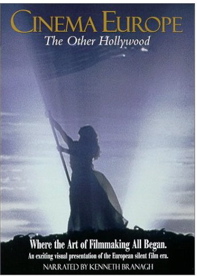| Release List | Reviews | Price Search | Shop | Newsletter | Forum | DVD Giveaways | Blu-Ray/ HD DVD | Advertise |
| Reviews & Columns |
|
Reviews DVD TV on DVD Blu-ray International DVDs Theatrical Reviews by Studio Video Games Features Collector Series DVDs Easter Egg Database Interviews DVD Talk TV DVD Talk Radio Feature Articles Columns Anime Talk DVD Savant HD Talk Horror DVDs Silent DVD
|
DVD Talk Forum |
|
|
| Resources |
|
DVD Price Search Customer Service #'s RCE Info Links |
|
Columns
|
 |
CINEMA EUROPE |

|
Cinema Europe, The Other Hollywood Image 1996 / B&W & Color / 1:37 / Dolby Digital Stereo / 6 hours Original Music Carl Davis, Phillip Appleby, Nic Raine Produced by Kevin Brownlow, David Gill, Susan McConachy |
The undisputed dean of the movie documentary is Kevin Brownlow, whose well-researched and excitingly written late 60's book The Parade's Gone By put what had previously passed for film education to shame. Brownlow started with a filmed piece on Abel Gance, and moved onward to a giant Thames television miniseries on silent movies that was released in the late '70s. He's been at the forefront of film research ever since.
This six part production made its American premiere on Turner Classic Movies cable television a couple of years ago, and is finally being offered on DVD in a sparkling presentation. Cinema Europe is a detailed analysis of movies on the continent from their turn-of-the-century beginnings to the start of the sound era. Kenneth Branagh reads the balanced and thoughtful narration. The first and last episodes are introductory and wrap-up bookends for the middle four, which concentrate on the national cinemas of Sweden, Germany, France, and England.
The wealth of information here is unparalleled. If you are used to German silent movies being explained with a few scraps of information on the rise of Naziism coupled with some ratty clips from Nosferatu and The Blue Angel, you're in for a surprise. Brownlow must have spent the '70s gathering filmed interviews because he has dozens of cameramen, actors, producers and crew people talking on camera, for films that in most documentaries are restricted to title and director. After writing about First Spaceship on Venus, Savant was shocked to see its director Kurt Maetzig, speaking here about the technical wonders of Metropolis. No wonder Maetzig was interested in science fiction!
The episode on France highlights Brownlow's mentor Abel Gance, but has a wealth of detail about little-discussed artists like L'Herbier, often illustrated with vintage behind-the-scenes footage. Germany's episode gives the most thorough look at the relationship between the expressionist movies and the economic and political chaos of the time. The breathtaking clips from the 'mountain films' of Fanck and Riefenstahl make one eager to see more. The dawning career of Alfred Hitchcock is one of the few bright lights in the early years of movies in England. On-camera testimonials from stars and filmmakers attest to the English climate of snobbery and disinterest (along with the quota-quickie mentality) that kept English talent from blooming.
The big surprise is the chapter on Sweden, a serious contender in the artistic sweepstakes that Savant has never seen displayed until this docu. In perfectly preserved clips, we see movies of great sensitivity and maturity -- made in the 'teens! More than just the home of Greta Garbo, Sweden had a great industry that was plundered by a stronger German one ... we are reminded that before Hollywood stole Garbo from Germany, the Germans stole her from Sweden.
What draws all this together into something better than a book on European cinema are knowledgeable ideas. Brownlows insights explain the whys and wherefores of classics that Savant saw twenty years ago in film school yet never really understood. At one point he shows a piece of G.W. Pabst's great movie Kameradschaft, in which workers coming to aid victims of a mine disaster. The mine straddles a national border and the passages have underground barricades. The workers tear down the barricades, but when the rescue is complete, the bureaucrats block them up again. Pabst's message is that instead of uniting as a fraternity of artists, Europe splintered with the political antagonisms of the times, and the artistic wonderments of the silent era continued only as fitful remnants. Cinema Europe is filled with the missing connections in the knowledge of even well read movie enthusiasts. It's a foreign silent film course in a box, and that's no overstatement.
Image has done a great job and a great service in bringing out this miniseries DVD of Cinema Europe. The irony, reported to Savant by British Docu filmmaker Craig McCall, is that it is not available in Europe!
On a scale of Excellent, Good, Fair, and Poor,
Cinema Europe, The Other Hollywood rates:
Movie: Excellent
Video: Excellent
Sound: Excellent
Packaging: One doublesided disc in an Alpha case
Reviewed: March 26, 2001
|
|
| Coming Soon |
|
|
| Special Offers |
|
|
| Columns |
| Home | Release List | Coupons | Shop | Reviews | Forum | Video Games | Price Search | Advertise |









